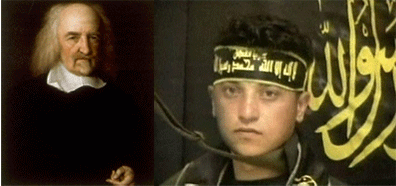
I write from the Syracuse International Airport, inside the security zone. Despite my guilty conscience, I passed the non-unionized TSA without a hitch. One guard even described my informal greeting as “the American way.†Would that other authorities so exercised their ethnographic faculties. But they do not, and recently two NYC cultural documents recalled our attention to this country’s addled take on religion, politics, and radicalism.
On Aug. 15, the NYPD published an “Intelligence Report,†which warns that Islamic radicalism is “permeating†(p. 66) New York City. Then on Aug. 19, Columbia University Professor Mark Lilla’s NY Times Magazine’s cover article ascribed the US-Islamic divide to the West’s advancement beyond, and Islam’s arrested adherence to, political theology. That the Times continues to publish dross should not surprise me. But coming on the heels of a call to arms by America’s Police, it made me wince at the paternalistic vapidity of what passes today for knowledge of the world.
Lilla discerns the West’s abandonment of political theology, a “Great Separation†of religion and politics, in Hobbes’s vision of a total state. Basically we do not understand Ahmedinejad’s messages, or Muslims at all, because, lacking Hobbes, they never evolved. For Lilla, our difference rests on an historical accident. And a truly generous reader may see Lilla’s piece as anti-Anglo-Americocentric: We must learn to live with Muslims despite their being insufficiently prepared for modernity because held—unlike us— “in the grip of a powerful political theology.†The hypothesis is dubious, and even Lilla suggests that the West has failed to kick the political theology habit; its specter creeps from the War of Religions to 20th century Nazism and Communism. (Of course—contemporary Muslims are just like Nazis and Bolsheviks!) But Lilla deploys “We†in “the West†to evince maximum collective feeling, and we know that today these terms refer only to the Anglophone world. Theorists of Islamofascism will praise this, as they no doubt will Lilla’s celebration of the American exception, our country’s faith in its constitution being a “miracle.â€
If Lilla takes the liberal high road of a peculiar relativism, the NYPD’s report blurs the genres of pseudo-sociology and paranoid rant. It identifies the stages of young diasporic Muslims’ radicalization, from anomie to identity to jihad. It then advises the suppression of civil society and public speech more habitually attributed to authoritarian Islamic regimes: “Bookstores, cafes, hookah bars, and Internet cafes [and] other seemingly benign venues among diaspora communities can often serve as locations for indoctrination and comprise a radical subculture within the city.†Seemingly benign, even Muslim Student Associations on college campuses should be interrogated.
When an NYPD Deputy Commissioner for Counter-Terrorism spoke with WNYC public radio host Brian Lehrer, he allowed that the report’s phrasing—especially the assessment of radical Islam’s “permeating the cityâ€â€”was not the best. Lilla is too learned of course to doubt his rhetoric; but his article is really a companion piece to the NYPD’s report, illustrating the Foucauldian point that disciplinary institutions align in their will to knowledge. Indeed each article claims to know Muslims in “their terms,†to understand how Muslims think or act. But how palid an understanding! Are we capable of real encounter?
NYPD: “What motivates young men and women, born or living in the West, to carry out ‘autonomous jihad’ via acts of terrorism against their host countries?â€
NYPD: “The answer is ideology. Ideology is the bedrock and catalyst for radicalization. It defines the conflict, guides movements, identifies the issues, drives recruitment, and is the basis for action. In many cases, ideology also determines target selection and informs what will be done and how it will be carried out.â€
If discussions of ideology have declined in the American criticism, accusations of others’ fanaticism serve the same purpose: to disqualify their thought as such. We have reason, and speak for ourselves. Muslims’ attachments, motivations and emotions are never adequately separated from themselves; something—Ideology, faith—grips and speaks through them. It “guides movements, identifies the issues.†It, not them, because they are possessed. We kill them to kill the “it” that always exceeds them.
Of course possession and fanaticism exist in the world, as does political theology. But real knowledge could surely use a dose of humility to admit that “We†are no more and no less fanatical than anyone else.
Emilio Spadola